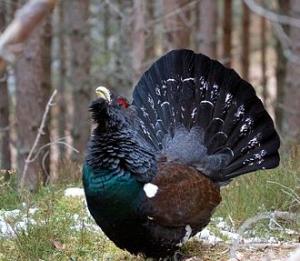EE-EY 10.1 Surveillance of Western Capercaillie I

Description: ProjectEstonian Fund for Nature (ELF) is NGO dedicated to nature conservation. Its mission is to preserve endangered species and their habitats, natural landscapes and natural associations typical of Estonia. ELF organizes yearly nature conservation holidays where volunteers, participants and group managers work together in order to improve the living conditions of a certain species (i.e. natter jack toad, black stork) or maintain semi-natural communities. You can read more on http://elfond.ee/en and see photos of volunteering camps 2019 and 2020: http://www.talgud.ee/galerii/2019 , http://www.talgud.ee/galerii/2020 The aim of this camp is the surveillance of the western capercaillie (Tetrao urogallus) and other Galliformes in Estonian mires and forests in the North-East of Estonia.The western capercaillie (Tetrao urogallus) is the largest Galliform in Europe. The male and female differ in colorization and size, whereby the hens are around 40 smaller than the cocks. The population of males in Estonia is about 1500 and the numbers are declining due to the loss of habitats. The surveillance and counting of specimens helps to evaluate the status of the species and take further action in its protection.North-East Estonia is a region of contrast. It is the largest industrial (oil shale) region of Estonia, spiked with underground mines and ruined landscapes. However, it is also the home to Alutaguse, the largest forestry region, and the newest National Park of Estonia. North-East Estonia has an interesting combination of industrial mining towns from the Soviet era, small villages along the coast of Lake Peipus, and endless wilderness. NB It is possible to combine both shifts of this project.
Type of Work: There are 3 species of Galliformes in Estonian forests: the western capercaillie (Tetrao urogallus), the black grouse (Tetrao tetrix), and the hazel grouse (Tetrastes bonasia). Prior to the work, an ornithologist will give an overview on how to differentiate between these species and how to recognize their feathers, feces and sound. Volunteers will spend workdays either alone or in pairs in individual areas. The task is to walk through the designated area taking notes of all the Galliformes or signs of the species. A smartphone or GPS will help you keep track of your whereabouts. A typical workday lasts for 6 hours. There will be no surveillance on days with heavy rain. The guidelines will be provided by ELF. Note that terrains may be rough, so choose your clothes and footwear accordingly.
Accommodation: Simple accommodation on mattresses or in beds with sleeping bags is provided. Showers and kitchen are available. One evening will be reserved for the traditional Estonian sauna. We will be cooking our own breakfasts and packing our own lunches throughout the camp. The Estonian group leader will compile the menu and buy the groceries. Dinner will be provided at the accommodation site.Volunteers will stay at Oonurme village on 8-14th June and near the Lake Peipus on 14-20th June. Those who stay for the whole period (13 days) will be relocated with ELF s minivan on the 14th of June.
Language: eng,eng
Requirements: Special requirementsParticipants need to bring suitable clothes for work (warm, waterproof), closed boots, swimming suits, sleeping bags, sunscreen, and mosquito repellent. Participation fee You are kindly asked to contribute 100 Euro towards cost of board, lodging, programme, administration and for nature This fee has to be paid by volunteers either by bank transfer before the beginning of the camp or to the host upon arrival to the camp.NB It is possible to join 2 shifts of this project in which case the participation fee is 150 Euro for both shifts.
Approximate Location: Itineraries-8th June. Around noon: arrival at Tallinn Airport. Public transport from Ulemiste train station to Kivioli (ca 1,5h, 11 euros). Pick-up from Kivioli with ELF s minivan. -9-10th and 12-13th June. Work in Tudu and Sirtsi mires (West- and East-Viru counties)-15-16th and 18-19th June. Work in Feodori mire near the Russian border (East-Viru county)-11, 14, 17th June. Free days to explore the local surroundings.-20th June. Drop-off to Kivioli. Public train to Tallinn (ca 1,5h, 11 euros).Leisure timeBoard games, sauna, swimming, hiking and exploring the local surroundings, etc.




